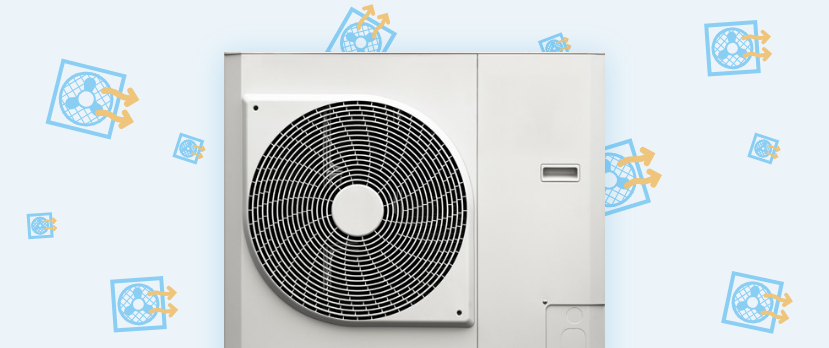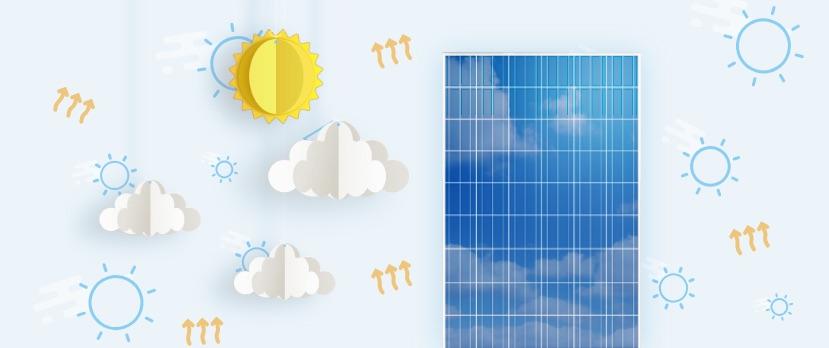Types of Renewable Energy Sources
With carbon emissions rising, turning away from fossil fuels and towards the various types of renewable energy sources is essential. Sustainable energy sources, such as solar, wind and water, deliver a constant supply of renewable energy without emitting carbon – a leading cause of climate change.
There are many types of renewable energy and we'll take you through them in this article.
What is renewable energy?
There are many types of renewable energy sources that all come from sustainable sources that will never run out. This is opposed to fossil fuels which we will have soon used up and once they're gone, they're gone.
Our renewable energy sources
Renewable energy can be generated from a number of sustainable sources. Types of renewable energy sources include the air, biomass, solar, wind, hydro and tidal.
Air
It's commonly known that wind can be used as a renewable energy source to generate power but heat can even be extracted from the air around us, an abundant source of energy that can be harnessed at almost any time (even in freezing temperatures) to generate heating for a home.
Biomass and biofuels
![]()
Biomass energy is a renewable energy source because it is produced from organic materials such as plants and manure. The most common forms used to generate biomass energy are wood, crops and manure.
Biofuels are a form of renewable energy derived from burning plant or animal substances, otherwise called combustion. One of the challenges to biofuels has been that it is not easily transferred into a liquid form which is the primary method used to fuel most cars and homes.
Geothermal
Geothermal comes from the Greek word "Geo" which means earth, so geothermal energy is heat derived from the Earth. It is considered to be a renewable source of energy as the water in the Earth is replenished by regular rainfall and the heat used is regularly produced by the planet.
Hydro Power
Hydro power or hydro energy is derived from the movement of water, rather than the natural heat of water (geothermal). One form of hydro power is generated through the movement of water through turbines, such as water running through turbines in a dam. Hydro power is considered a renewable energy source as the water is continuously cycled back through the plant or into nature.
Solar
In one form or another, solar power has been around for thousands of years. As a renewable source of free, green energy, technology has found a way of harnessing the sun's energy via solar panels.
Tidal
Tidal movement of the oceans generates kinetic energy which, using a generator and turbine can be converted into electricity to power appliances.
Wind Power
Wind power is used as a means of generating electricity by wind turbines which are capable of harnessing the power derived from the wind, converting kinetic energy into mechanical energy. A source of clean, green renewable energy, favourable climate conditions in Europe means wind energy is a highly viable method for electricity generation. And none more so than in the UK, with 40% of all wind energy in Europe blowing over the country.
What about hydrogen energy?

Hydrogen is another potential solution to tackling the planet's carbon emissions but you won’t see if on a list of the types of renewable energy sources.
The vast majority of UK homes rely on a gas boiler to provide heating and hot water. These gas boilers burn natural gas to produce energy. While natural gas is an effective fuel for home heating, the process does emit carbon into the atmosphere. So to lower carbon emissions from home heating (which accounts for around 20% of all UK carbon emissions) an alternative to the gas boiler must be found.
There's an increasing case for heat pumps which can generate energy from the air or ground. However, heat pumps are currently expensive to install and retrofitting them into millions of UK homes to replace boilers is impractical.
Ideally, homes would be able to continue using boilers but with a low-carbon fuel alternative. And this is where hydrogen comes in.
As hydrogen is a gaseous fuel, it could potentially use the same pipelines, fittings and boilers as natural gas. This would make a switch to hydrogen a practical and lower-cost solution to lowering carbon emissions.
Hydrogen contains more energy than gasoline and, when burned, it doesn't produce any carbon emissions.
Even if the gas network didn't make a complete switch to hydrogen, a hydrogen blend of natural gas and hydrogen would help to significantly lower carbon emissions.
Note: It isn't yet possible to buy a hydrogen-ready boiler or have one installed. However, boiler manufacturers Baxi and Worcester Bosch are developing prototypes.
Non-renewable energy sources
Natural gas, oil, coal and LPG are non-renewable energy sources. This means that the supply of these fuels will eventually run out. In addition, when burned they all emit carbon emissions into the atmosphere and contribute to climate change.
Finding an alternative to fossil fuels – which we've become so reliant upon – is essential in the fight against climate change.
The UK has set a target of achieving net zero carbon emissions by 2050. And to achieve this, the way we heat our homes has to change.
Using renewable energy in the home
Renewable energy systems are more accessible than ever. Which means that more households can experience the many benefits renewable heating systems have to offer:
- Cheaper energy bills
- Smaller carbon footprint
- Reduced reliance on your energy supplier
- Cash payments through the Renewable Heat Incentive (RHI)
- Typically require far less maintenance than a conventional boiler
- Won't need replacing for much longer than a traditional boiler (heat pumps and solar thermal panels can last for 20-25 years)
Renewable heating systems take many forms. Some of the most popular technologies include:
- Air source heat pumps for heating and / or hot water production;
- Ground source heat pumps for wet central heating systems;
- Biomass boilers for wet central heating systems;
- Solar thermal panels for a renewable wet central heating system.
There are 2 types of solar panels: solar PV and solar thermal. While solar thermal panels heat a wet central heating system, solar PV panels supply free renewable electricity.
If you're interested in solar panels and would like free no-obligation quotes, place a quick enquiry with Solar Guide. You'll then be connected with up to 3 MCS registered solar installers in your area.
Rather than making a complete switch to renewables, you can transition with a hybrid heating system. A hybrid heating system would allow your existing gas or oil boiler to be paired with a renewable heating system.
Popular renewable heating systems
There's no shortage of options when it comes to finding a suitable renewable heating system for your home.
Air source heat pump

An air source heat pump operates like a refrigerator in reverse. Air source heat pumps sit outside the property and draw in air via a rotating fan. A refrigerant chemical then absorbs the latent heat from the air before being used to heat the home.
Air-to-air heat pumps then heat the space in the home while air-to-water heat pumps produce domestic hot water and a wet central heating system.
Is an air source heat pump right for your home?
All renewable heating systems offer many benefits, including lower energy bills and a reduced carbon footprint. However, it's worth looking into the specific benefits of each system too. This will help you to find the most suitable renewable heating system for your home.
Benefits of an air source heat pump include:
- Highly efficient technology that's around 400% efficient – much higher than the 90-94% efficiency of modern conventional boilers
- Able to generate heat from the air all year round (some models still work effectively in temperatures as low as -25°C)
- Won't need to be replaced for as long as 20-25 years depending on the model
- Widely known as 'fit and forget' technology as they require very little maintenance
- Can be paired with a conventional boiler as part of a hybrid heating system
As with any investment, you need to look into the potential downsides as well as the benefits:
- Produce heat at a lower temperature which makes them better suited to large radiators or underfloor heating
- Property needs to be well insulated
- They have some operating noise
- Electricity used to power the heat pump is more expensive than gas and oil
- Some outdoor space for the unit is essential
Find out more about air source heat pumps.
Biomass boiler

Biomass boilers burn wood pellets, wood chips or logs. The generated heat is then used to produce hot water for wet central heating systems. In some cases they can also be fueled by biological material from plants and plant-based organisms.
Burning wood rather than gas or oil is much more sustainable as we can plant and grow new trees. We can't replace the gas or oil we're currently burning for fuel without waiting a few million years. It's also possible to create biomass energy by converting these substances into methane gases, ethanol and biodiesel fuels. These fuels can easily be adapted to our current methods of energy use.
Is a biomass boiler right for your home?
Choosing a boiler that runs on biomass can prove to have many benefits over a conventional boiler:
- Burning wood and plants is carbon neutral process
- Biomass is often cheaper than oil and electricity. Plus, if you live near a wooded area then you could potentially fuel the boiler for free
Before investing in a biomass boiler, it's worth making some considerations:
- Potentially the most expensive renewable heating system and far pricier than a boiler that runs on gas, oil or electricity
- Biomass boilers take up much more space than conventional boilers and the fuel will need to be stored onsite
- Manual biomass boilers will need cleaning on a weekly basis while automatic models will take care of this themselves
Find out more about biomass boilers.
Ground source heat pump

Ground source heat pumps (also known as geothermal heat pumps) harness the natural heat underground. They extract heat via tubes of fluid buried under the ground outside of a property. This fluid absorbs the heat from the ground so it can be used to heat your home and water. The tubes can either be installed straight down in vertical boreholes or horizontally – more space will be required for horizontal installation.
Is a ground source heat pump right for your home?
A ground source heat pump is a highly efficient renewable heating system that can benefit your home in many ways:
- Very quiet in operation
- Require little maintenance during their lifetime
- Will last much longer than a traditional heating system
- Can lower the carbon emissions of your home by 2-8 tonnes each year
- Could help to increase the value of your property
While a ground source heat pump can help to significantly lower heating bills, the installation in particular is a key consideration to make:
- Your home must be well insulated to get the most out of a ground source heat pump
- Requires a substantial amount of outdoor space for the underground pipes (particularly for horizontal installations)
- The installation will require digging machinery so your garden must be accessible
Find out more about ground source heat pumps.
Solar thermal panels

Solar thermal panels use the sun's energy to heat water stored within a hot water cylinder. This hot water can then be delivered to taps, baths, showers or a wet central heating system.
Are solar thermal panels right for your home?
A solar thermal heating system is one of the best suited renewable heating systems for retrofit installation. This is because they're installed on the roof rather than within the property or a garden area. Some of the benefits specific to solar thermal panels include:
- Able to meet between 40% and 70% of the hot water for a family of 4 each year
- Other than being looked over by a professional every few years, solar thermal panels have very low maintenance costs
These are some of the key considerations to make with the installation of solar thermal panels:
- Not compatible for installation alongside a combi boiler
- Homes with a gravity-fed regular boiler an extra valve or pump will need to be added to the system
- For optimal performance, solar thermal panels need to be installed on a south-facing roof at a 20-50 degree angle
Find out more about solar thermal heating.
Cost of installing renewable energy at home
Switching to a renewable heating system can be a considerable investment with prices ranging from £3,000 to £21,000 depending on the technology.
<table
Renewable Heating SystemPotential CostAir Source Heat Pump£4,000 – £11,000Ground Source Heat Pump£8,000 – £12,000Biomass Boiler (manual)£4,000 – £10,000Biomass Boiler (automatic)£9,000 – £21,000Solar Thermal Panels£3,000 – £7,000
While these initial prices might seem high, you will potentially see considerable savings on your energy bills. And that could see you eventually make a return on your initial investment - something you wouldn't get with a gas or oil boiler.
Renewable heating systems may sound expensive but heat pumps and solar panels can last twice as long as a modern boiler.
In addition to energy bill savings, there are incentives and grants designed to encourage homeowners to invest in renewable heating.
Renewable incentives and grants
To encourage homeowners to invest in renewable heating systems there are some incentives and grants available. Green Homes Grants help with the upfront costs of installing a renewable heating system while the Renewable Heat Incentive rewards households with cash payments for the renewable energy generated after installation.
Renewable Heat Incentive (RHI)
Under the Domestic Renewable Heat Incentive, homeowners with an eligible renewable heating system are entitled to receive quarterly cash payments. The RHI began in April 2014 and is due to come to an end in March 2022 and will be replaced by the Clean Heat Grant.
Eligible heating systems include biomass boilers (wood-fueled), biomass pellet stoves with an integrated boiler, air to water heat pumps, ground to water heat pumps and solar thermal panels.
Payments through the Renewable Heat Incentive can earn you a return on your investment in renewable energy.
The RHI tariff is adjusted on a quarterly basis. Below is the tariff set by Ofgem for 1 July and 30 September 2020.
| Renewable Heating System | Payment (p/kWh) |
|---|---|
| Biomass Boiler | 6.97 |
| Air Source Heat Pump | 10.85 |
| Ground Source Heat Pump | 21.17 |
| Solar Thermal | 21.37 |
Note: Commercial buildings (businesses, schools and hospitals) can apply for the Non-domestic RHI scheme.
Is renewable energy right for your home?

Increasing the efficiency of UK homes is essential in lowering carbon emissions and renewable energy has a big role to play.
Having a system to generate your own free renewable energy will see your property become more self-sufficient. And this means having less reliance on your energy supplier which, in turn, will mean lower energy bills. Add in the fact that you can earn payments through the Renewable Heat Incentive and there's potential to even see a return on your investment.
All of these benefits should make renewable energy right for any home. However, there are a number of considerations to make before having a renewable heating system installed:
- May need to invest in a larger heat delivery system, such as underfloor heating or radiators with a large surface area, as the water is heated to a lower temperature
- To feel the full benefit of a renewable heating system, the property must be well insulated
- Solar thermal panels must be installed alongside a hot water storage cylinder
Keeping the initial installation costs to a minimum is sure to be a high priority when investing in renewable heating. To do this, we highly recommend comparing installation quotes from multiple installers. This way, you can be confident that you're getting the most competitive price from the best company for the job.
With Boiler Guide, you can get free quotes for a renewable heating system from up to 3 installers in your local area. Simply complete our online form – which should only take a few seconds – and we'll match your needs with qualified installers.



